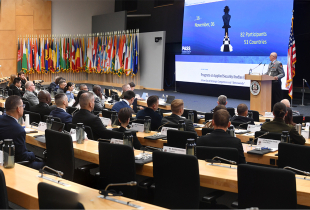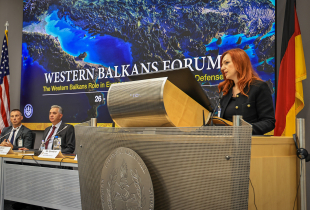
English Enhancement Course Strengthens Marshall Center’s Network
By Christine June
Public Affairs Office
George C. Marshall European Center for Security Studies
GARMISCH-PARTENKIRCHEN, Germany (Aug. 11, 2016) – Beninese Armed Forces Lt. Mathieu Zanmassou freely admitted that he had no idea what countering transnational organized crime meant in English.
He knew what those words meant in French, but his country selected him to attend the Program on Countering Transnational Organized Crime (CTOC) at the George C. Marshall European Center for Security Studies. He was concerned that his English language skills were not strong enough for the English-only curriculum.
For Zanmassou and about a dozen other participants beginning CTOC, the Marshall Center’s Partner Language Training Center Europe (PLTCE) developed a five-week intensive English Language Enhancement Program, as well as for other resident programs to help them increase their confidence and English-language proficiency.
“Now, I am well informed on what CTOC is, and I know about 90 percent of the topics that will be covered in the course and almost all of the vocabulary,” Zanmassou said. “ELEC really helped my confidence in my ability to speak and understand English.”
Zanmassou and his classmates graduated from ELEC Aug. 9, and blended in with 70 other participants from 45 more countries in the CTOC class that began Aug. 10.
ELEC underscores the diversity found in Marshall Center resident courses.
“This class had five female participants, which is the most we have had in the ELEC,” said Peggy Garza, chair of the English Language Program Department at the Marshall Center’s PLTCE.
During the graduation ceremony, Professor Joseph Vann, CTOC director, stressed, “English is one of the true global languages. Continue to work on your English proficiency because it increases your ability to network. You will hear ‘it takes a network to defeat a network” in CTOC. Whether it is a network to defeat a terrorist network or a network to defeat a network of transnational criminals, your ability to speak to one another in English as a network will be very, very important.”
To help them prepare for this CTOC course, participants engage with faculty through lectures and discussions. Garza said that this is an important aspect to help participants increase their English-language capabilities.
“We try to mirror the follow-on resident program as much as we can by introducing them to the course-related vocabulary and grammar structures so they will feel more comfortable with the English language and be able to communicate so that others can understand them and they can understand others,” said George Andersen, an ELEC instructor.
Besides increasing their ability to communicate in English, ELEC participants learned a little more.
“You taught us not only English, but also how to support each other and work together,” said Gantuya Bazargur, with the Legal Policy Department of Legal Reform Policy in Mongolia, speaking about Andersen on behalf of her class during the ELEC graduation ceremony. “We are prepared for CTOC and will do our part to combat crime.”
Transnational organized crime is growing in size and influence in a world increasingly marked with globalization and diminishing importance of borders, said Vann. CTOC examines the major methods by which transnational criminal and terrorist organizations engage in criminal activities.
“When you join the CTOC class, I would like for you to take the skills you learned in this course and immediately apply them to your new seminars,” said Vann, during the ceremony. “You have already learned how to collaborate and reach across the desk and say ‘I got an idea’ or ‘this is how it is in my country,’ or ‘this is my challenge.’
“Use these skills, and you will find that it will help you in the rest of the seminars that you will be in, and actually, accelerate it into the type of teamwork, comradery atmosphere that you enjoyed during ELEC,” Vann said.
Vann’s last words to the ELEC graduates were, “You are the future.”


